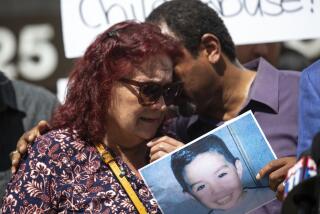When Parents Totally Abdicate : New law aimed at extreme cases is upheld
- Share via
Of the many responsibilities of parenthood probably none is more compelling than trying to give a child a clear and guiding sense of what is right and what is wrong. That effort, as every parent knows, may not always succeed. But even after repeated disappointments the parental duty to try remains. Failure after good-faith efforts can be excused. A failure even to try can’t be.
THE RESPONSIBILITY: The California Supreme Court, in a unanimous decision, has rejected a challenge to a 1988 law that holds parents liable if their failure to exercise “reasonable care, supervision and control” leads to criminal behavior by their dependent children. The law was drafted as part of a package of anti-gang legislation to try to deal with cases where parental permissiveness or abrogation of responsibility encouraged juvenile crimes.
The law was applied in 1989 to a woman whose son was convicted in a gang rape. The mother’s posing for photos with her son and other gang members was taken as evidence of her toleration for their activities. Under the law, a parent can escape prosecution by completing a parenting class. The woman in this case did so, and charges were dropped. But the constitutionality of the law was appealed on the grounds that it is too vague to be fairly applied.
In rejecting that contention the Supreme Court found that the law in fact sets a reasonable standard: that parents must make a genuine effort to control their trouble-prone children. The law does not intend that any parent whose kid runs afoul of the law is to be held personally accountable. It does not, as Justice Stanley Mosk wrote for the court, set out to “trap the innocent.” Responsible prosecutors will certainly recognize the need for careful prosecution and know the difficulties that all parents have, including low-income parents who may be struggling simply to survive economically and sometimes face extraordinary parenting challenges. But it does make possible the prosecution of those parents whose inaction or indifference in the face of criminal activity by their children seems to constitute toleration or even encouragement of what they are doing.
THE LIMITATION: The law, which carries penalties of up to one year in jail and a $2,500 fine, is not going to lead to mass prosecutions or jailings. It is likely to be used very sparingly, though it does give prosecutors a new lever. (For some time irresponsible parents have been subject to legal problems in civil, as opposed to criminal, actions.) In any event, prosecution can be avoided if parents take a class that aims to teach them what some of their basic duties are. But the law does serve as a warning, putting parents on notice that they can be called to account for what their children do if they have made insufficient effort to control their children’s offending behavior.
A major weapon in the anti-crime arsenal? No. But if this law works only to nudge a small percentage of indifferent parents into taking a firmer hand with their children and so keeping them out of trouble, it will have served its purpose. It will have made a crime-beset society fractionally better off.
More to Read
Sign up for Essential California
The most important California stories and recommendations in your inbox every morning.
You may occasionally receive promotional content from the Los Angeles Times.












